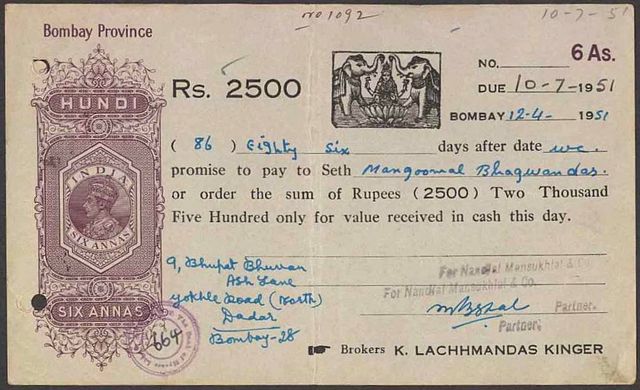A negotiable instrument is a document guaranteeing the payment of a specific amount of money, either on demand, or at a set time, whose payer is usually named on the document. More specifically, it is a document contemplated by or consisting of a contract, which promises the payment of money without condition, which may be paid either on demand or at a future date. The term has different meanings depending on its use in the application of different laws and depending on countries and contexts. The word "negotiable" refers to transferable and "instrument" refers to a document giving legal effect by the virtue of the law.
A 1939 promissory note, Rangoon, Burma.
An 1870 bill of exchange payable in London with British Foreign Bill revenue stamps attached.
Belgian bill of exchange, 1933
A contract is an agreement that specifies certain legally enforceable rights and obligations pertaining to two or more parties. A contract typically involves the transfer of goods, services, money, or a promise to transfer any of those at a future date, and the activities and intentions of the parties entering into a contract may be referred to as contracting. In the event of a breach of contract, the injured party may seek judicial remedies such as damages or equitable remedies such as specific performance or rescission. A binding agreement between actors in international law is known as a treaty.
A Sumerian contract for the sale of a field and house in around 2600 BCE. As sedentary civilisations began to develop during the Bronze Age, contracts emerged as a necessary part of daily economic life.
A hundi for Rs 2500 of 1951, stamped in the Bombay Province with a pre-printed revenue stamp. Hundis represent one of the earliest iterations of modern negotiable contracts.
The Carbolic Smoke Ball offer
Hugo Grotius, one of the jurists credited with the development of Roman Dutch law







